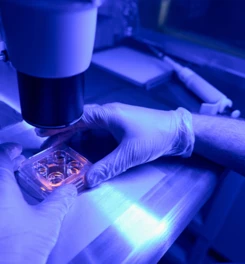Each year, around 44,500 people are diagnosed with lung cancer in the UK. It is the third most common cancer in the UK, affecting mainly older people. The condition is rare among people aged under 40 and is most common in those aged 70-74.
Smoking is the main cause of lung cancer, accounting for the vast majority of cases, although it can still develop in those who have never smoked.
LUNG CANCER IN OUR AREA
Overall for the North West, lung, trachea & bronchus cancer rates are 20% higher than the rest of England. Merseyside lung cancer rates are 59% higher than the national benchmark. Greater Manchester’s communities are also being heavily affected, experiencing rates 24% higher than the English average. Cheshire sees lung cancer rates that are 14% higher.
Lung cancer is the third most common cancer in North Wales. Cancers of the lung, trachea and bronchus are number one for total cancer deaths in North Wales.
TYPES
There are two main types of primary lung cancer. They are:
- non-small-cell lung cancer – the most common type, accounting for more than 80% of cases;
- small-cell lung cancer – a less common type that usually spreads faster than non-small-cell lung cancer
The type of lung cancer you have determines which treatments are recommended.
SYMPTOMS
There are usually no signs or symptoms in the early stages of lung cancer, but many people with the condition eventually develop symptoms including:
- a cough lasting longer than 3 weeks
- coughing up blood
- persistent breathlessness or chest infections
- regular tiredness and lack of energy
- aches or pains when breathing or coughing
- Lumps in the neck or clavicle
- loss of appetite or weight
Lung cancer doesn't usually cause noticeable symptoms until it's spread through the lungs or into other parts of the body.
CAUSES
Lung cancer mainly affects older people, and is rare in those younger than 40.
You may be more likely to develop lung cancer if you...
- Smoke
- Inhale passive smoke
- Have been exposed to asbestos, radon gas, occupational chemicals or air pollution
- Family history of lung cancer
If you are between 55 and 74 and have ever smoked, you may be offered a free NHS lung
health check that could detect cancer at an earlier stage.
DIAGNOSIS
There are several ways doctors can diagnose lung cancer.
A chest X-ray is usually the first test used to diagnose lung cancer. Most lung tumours show up on X-rays as a white-grey mass. However, chest X-rays can't always give a definitive diagnosis so you may be referred to a specialist.
A specialist can carry out more tests to investigate whether you have lung cancer and, if you do, what type it is and how much it's spread. A CT scan is usually carried out after a chest X-ray. A CT scan uses X-rays and a computer to create detailed images of the inside of your body. A PET-CT scan may be carried out if the results of the CT scan show you have cancer at an early stage. The PET-CT scan can show where there are active cancer cells. This can help with diagnosis and treatment.
If the CT scan shows there might be cancer in the central part of your chest, you'll have a bronchoscopy. This is a procedure that allows a doctor or nurse to remove a small sample of cells from inside your lungs.
You may also be offered a different type of biopsy. This may be a type of surgical biopsy such as a thoracoscopy or a mediastinoscopy, or a biopsy carried out using a needle inserted through your skin.
TREATMENT
If the condition is diagnosed early and the cancerous cells are confined to a small area, surgery to remove the affected area of lung is usually recommended.
If surgery is unsuitable due to your general health, radiotherapy to destroy the cancerous cells may be recommended instead.
If the cancer has spread too far for surgery or radiotherapy to be effective, chemotherapy is usually used.
Overall, about 1 in 3 people with the condition live for at least a year after they're diagnosed and about 1 in 20 people live at least 10 years.
However, survival rates can vary widely, depending on how far the cancer has spread at the time of diagnosis.
Early diagnosis can make a big difference.
PREVENTION
If you smoke, the best way to prevent lung cancer and other serious conditions is to stop smoking as soon as possible.
Every year you don't smoke decreases your risk of getting serious illnesses, such as lung cancer.
Improving your diet and doing more exercise can also help to prevent developing lung cancer.
If you have any concerns about the signs and symptoms of lung cancer, please visit your GP.

New drug targets for small cell lung cancer
A North West Cancer Research funded team at The University of Manchester, headed by Professor Caroline Dive, are investigating the disease progression of small cell lung cancer (SCLC) from diagnosis to post-chemotherapy in order to identify new treatment options.
Find out more